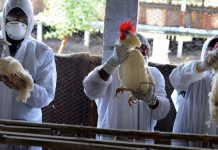You might have come across swine flu, bird flu, and even camel flu. But, did you ever come across dog flu?
There are fears growing that you may catch influenza from your pet dog.
Researchers found that some types of flu, which can spread between animals, might actually be able to mutate and spread from dogs or cats to humans. They said since the strains are different from others, they may spread uncontrollably and quickly among humans.
People should keep a close eye on dogs as well as other mammals in case of interspecies transmission, warned researchers. The even warned about a potential pandemic.
Scientists at Korea University, South Korea, conducted a study to watch for flu strains spreading between animals. And what they found has been added to other research at Mount Sinai University in New York last year.
The researchers discovered swine flu and bird flu could spread to dogs and cats. Swine flu currently ravaging pig farms in China, leaving large amounts of meat unusable.
They also found that in dogs, the strain could mix with another strain, causing viral infection, which would spread among people who would be defenseless against the infection because it is so new.
One of the researchers Dr. Daesub Song said, “Until now, dogs were considered neglected hosts in the field of flu research. However, after the first report of interspecies transmission, surveillance of flu viruses from companion animals should be further strengthened.”
Dr. Song and his team of researchers found that dogs could catch bird flu or swine flu, mixing with each other to mutate into a new strain of dog flu called “CIVmv.”
The scientists found that CIVmv was found to be highly infectious to mammals when passed on by dogs, suggesting that it is more likely to be infectious for humans.
Dogs and cats are already vulnerable to canine flu, and they spend a great amount of time in close contact with humans.
If these animals encounter the new strain, they suffer from coughing, congested airways, sneezing, runny eyes, fatigue, and loss of appetite.
Canine flu can be deadly; it kills nearly 40 percent of cats and a small percentage of dogs, explained Dr. Song.
This new dog flu strain could be more contagious; however, it is idiopathic whether it will be fatal in animals.
Dr. Song added, “Pre-existing CIV may recombine or re-assort with human influenza viruses and give rise to novel viruses that could in turn lead to unique pandemics.”
Immune resistance to influenza and its ability to get over it quickly is actually based on the exposure to the virus or its strains in the past. For instance, if you catch a strain of the flu you have already had, there is a good chance you will not become ill from it.
And since the way viruses mutate over time, exposure to the earlier version of a different virus can make you more resistant to it. So, you could be particularly vulnerable if you catch a combination of swine or bird flu and dog flu, which you have never encountered before.
Dr. Song will unveil his research at the Microbiology Society’s Annual Conference in Belfast in April. The researchers are working on a vaccine to prevent dog flu, but the virus is mutating fast, making things a bit difficult.























